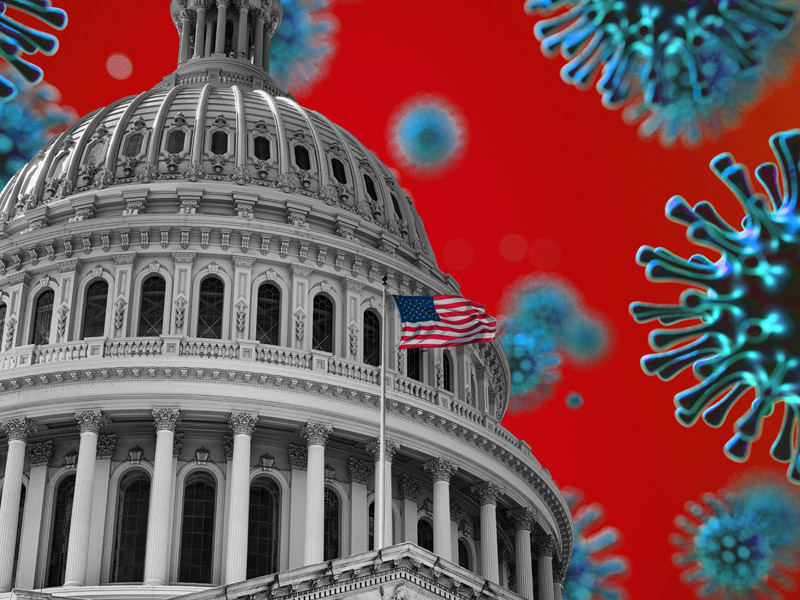
by Brian Williams, PhD, Carl Larson, PhD, Kathy Irene Kennedy, DrPH, MA, Allan Wallis, PhD, Victor Dukay, MBA, PhD, Darrin Hicks PhD, and Reuben Granich, MD, MPH.
- 16 March 2021
Share:
Operation Warp Speed, the Trump administration’s program to accelerate the development, manufacture, and distribution of a Covid-19 vaccine, cost an estimated $14 billion and enabled some of the world’s elite scientists to set an astonishing record for the speed of development of new vaccines.
Then came the rollout.
Since the U.S. Food and Drug Administration approved the first vaccine on December 11th, chaos, confusion, desperation, and pockets of organized resistance have rippled across the United States as beleaguered public health officials struggle to find ways to get vaccines into the arms of Americans.
In Denver, an announcement that 200 doses of the vaccine were available resulted in hundreds of teachers speeding to the distribution site, some abandoning their cars on the road and creating a traffic jam on the highway as they frantically ran to the vaccination area hoping to get some of the coveted shots.
Meanwhile, in Los Angeles a group of anti-vaccine, anti-mask protestors converged on a vaccination event at Dodger Stadium on January 30th, forcing the city to close the site temporarily. This occurred during a period when California was averaging 500 deaths a week from Covid-19.
It’s madness.
While investing in the science of vaccine development is a crucial step in addressing a pandemic that has killed more than 2.6 million people worldwide, it is just the beginning. Without effective leadership, efforts to manufacture, equitably distribute, and build public trust in the vaccination program are destined to fall perilously short.
While pundits and many politicians pay lip service to the concept of “leadership”, the term often is so nebulous that to call for a higher level of it is meaningless. And yet, as we have learned through cruel experience, effective leadership can be a matter of life and death. As science has advanced our understanding of how to treat and prevent Covid-19, the missing link is our understanding of the role that leadership plays in meeting such a monumental global public health challenge.
Around the world, people are laser-focused on medical science to provide the tools to eradicate Covid-19. Few understand that the need for scientific research into effective pandemic leadership is just as critical.
We need to research effective leadership practices in public health, not only to improve outcomes in the next critical phases of this pandemic, but to inoculate our leaders against future deadly failures to respond effectively to public health crises.
This historic public health crisis presents an extraordinary opportunity to conduct rigorously unbiased research on the attributes of effective leadership. The pandemic has provided and continues to provide a mountain of data for such an analysis. Measuring progress against Covid-19 as documented in such data as vaccine distribution rates, virus positivity rates, deaths, and the resumption of normal economic activities could clearly identify the relative effectiveness of leadership attributes exhibited in each country or community.
And yet, no effort has been made to mobilize scientific expertise to identify and quantify which practices and behaviors work. We need to research effective leadership practices in public health, not only to improve outcomes in the next critical phases of this pandemic, but to inoculate our leaders against future deadly failures to respond effectively to public health crises.
Research could create a measurable “leadership factor” in which the practices and behaviors of leaders could be incorporated into epidemiological models to improve predictive accuracy alongside medical data on successful treatment options and vaccine effectiveness rates.
As scholars in applied leadership science, we need to dream bigger than individual research efforts in these areas. We need national and international agencies to fund, gather, analyze, and apply empirical data on the actions taken by leaders at international, national, state, provincial, and local levels around the world and the resulting outcomes.
The COVID-19 crisis will be with us for years — even with aggressive vaccination programs that are currently underway .
Effective leadership and confidence in our leaders are essential to meet the challenges facing us in the next critical phase of this pandemic and to inoculate our leaders against future deadly failures to respond effectively to future threats to our planet and to our collective wellbeing.
We can’t afford to waste this crisis.
Brian Williams, PhD, is a retired epidemiologist from the World Health Organization in Geneva, Switzerland where he focused his work on the HIV epidemic.
Carl Larson, PhD, is professor emeritus at the University of Denver and has consulted on leadership for the Centers for Disease Control and Prevention, the Environmental Protection Agency, the National Aeronautics and Space Administration, the Federal Bureau of Investigation, and the U.S. Congress.
Kathy Irene Kennedy, DrPH, MA, teaches global public health and public health leadership at the University of Colorado Anschutz Medical Campus and is executive director of the Regional Institute for Health and Environmental Leadership.
Allan Wallis, PhD, is a retired associate professor of public policy at the University of Colorado Denver School of Public Affairs where he directed research for the National Civic League and facilitated the development of a comprehensive HIV/AIDS service plan for Colorado.
Victor Dukay, MBA, PhD, the 2011 recipient of the Dr. Thomas A. Dooley Humanitarian Award from the University of Notre Dame, is president of the Lundy Foundation where his focus is on the empirical measurement of teamwork, collaboration and organizational effectiveness.
Darrin Hicks, PhD, is a professor at the University of Denver where he teaches and conducts research in argumentation, rhetoric, community collaboration, and the philosophy of communication.
Reuben Granich, MD, MPH, has more than 35 years of experience in public health, working for national, state, and local governments, the United Nations system, and in private-sector health care delivery.
For additional information or to request a copy of the concept paper, BENDING THE CURVE: Understanding How Leadership Affects Pandemic Responses, November 2020, contact: Victor Dukay, MBA, PhD, vic@lundyfoundation.org

